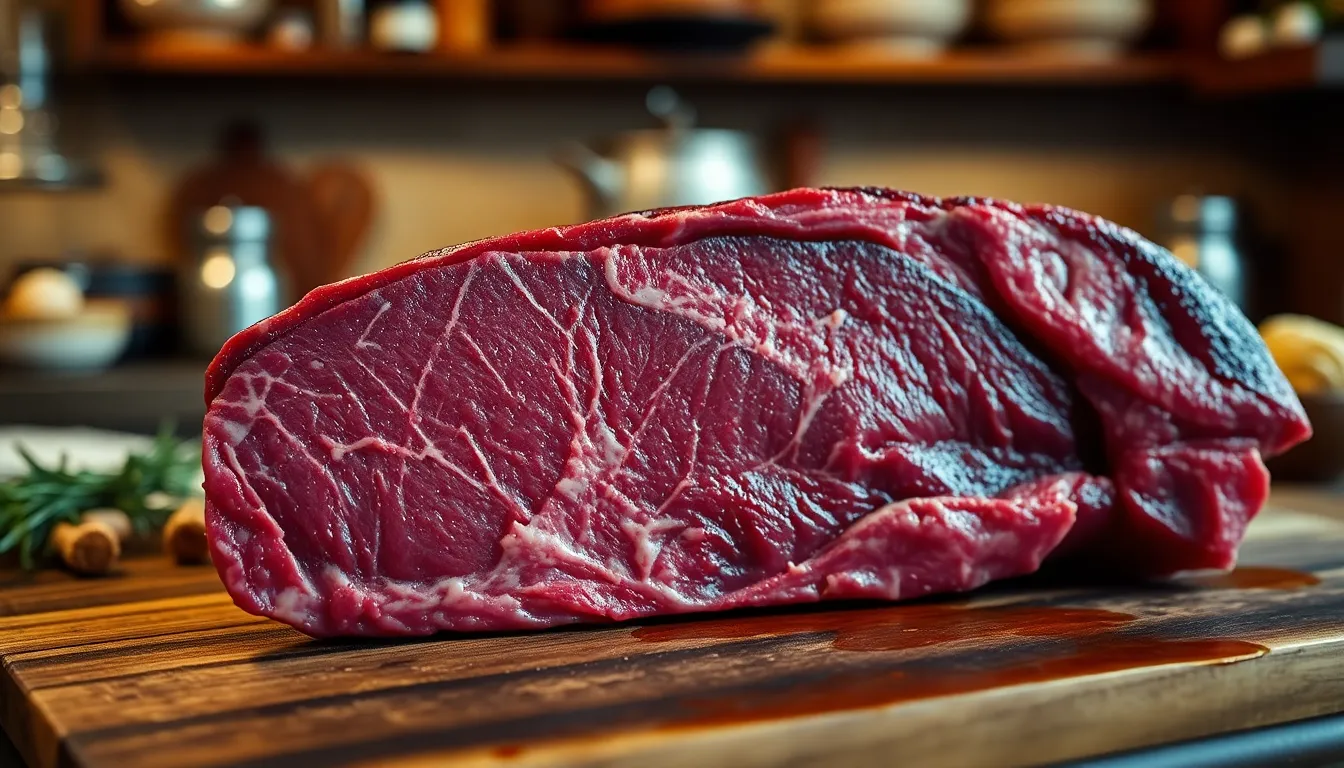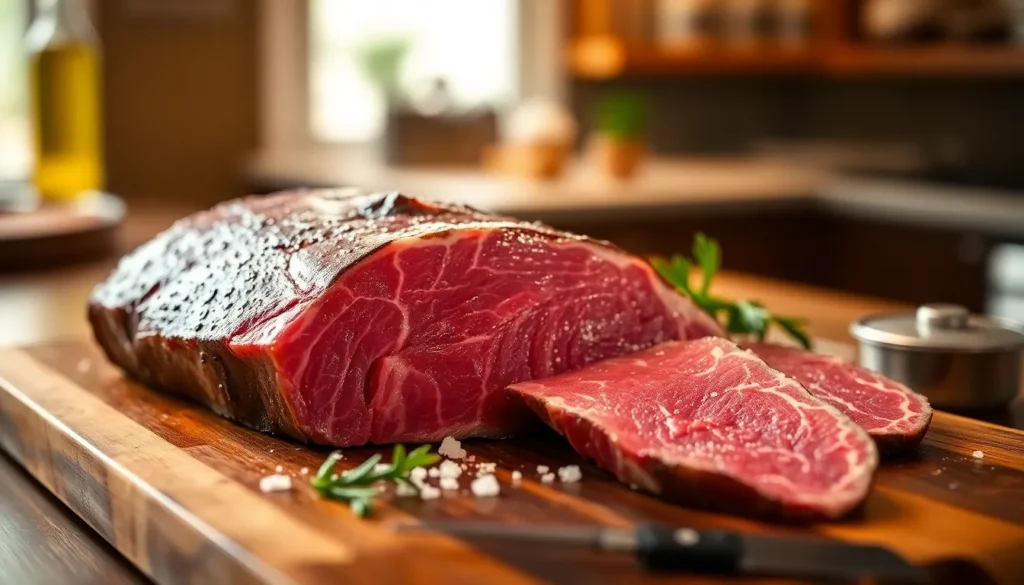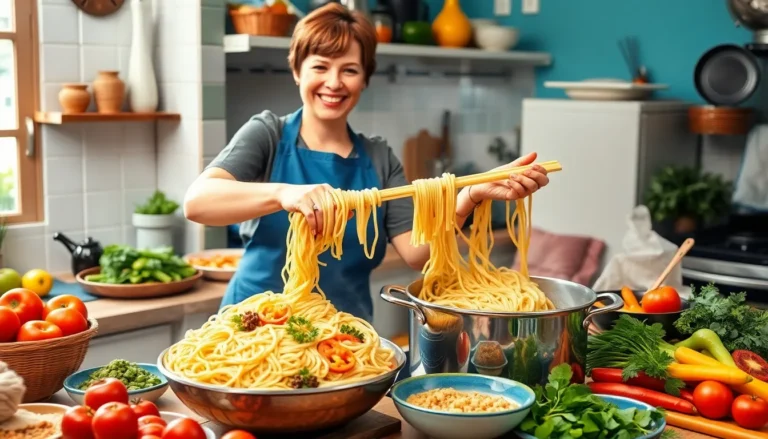Wagyu beef isn’t just a meal; it’s an experience that leaves taste buds dancing and wallets crying. With its melt-in-your-mouth texture and rich flavor, it’s no wonder this luxurious delicacy has food enthusiasts drooling. But before diving into a Wagyu wonderland, one must face the elephant in the room: the price per kilogram.
As the saying goes, you get what you pay for, and in the case of Wagyu, that means indulging in a steak that could easily be the star of a culinary blockbuster. So, how much does this meaty masterpiece really cost? Let’s unravel the mystery behind Wagyu beef prices and discover if it’s worth every penny—or if it’s just a fancy way to empty your bank account while savoring a slice of heaven.
Table of Contents
ToggleOverview of Wagyu Beef
Wagyu beef originates from Japan, specifically from four breeds of cattle: Japanese Black, Japanese Brown, Japanese Shorthorn, and Japanese Polled. Each breed contributes unique qualities, influencing the marbling, tenderness, and flavor of the meat. The renowned marbling of Wagyu beef results from a genetic predisposition, leading to an unparalleled eating experience.
Quality grades for Wagyu beef depend on the level of marbling, firmness, and brightness. The highest grades, A5 and B5, indicate exceptional marbling and quality, often commanding premium prices. Prices can vary significantly based on the cut and market demand, but Wagyu beef frequently ranges from $150 to $600 per kilogram.
Production practices also affect Wagyu beef prices. Farmers employ specific feeding techniques and environmental conditions to maximize quality and flavor. Traditional methods may include sake or beer in the feed to enhance the meat’s texture.
Countries outside Japan now produce Wagyu. Australia and the United States have invested in breeding programs, yielding high-quality Wagyu beef that competes with Japanese varieties. Prices for domestically produced Wagyu beef may be more accessible, often reflecting a range from $50 to $300 per kilogram.
Consumers often perceive Wagyu beef as a luxury item based on its rarity and unique characteristics. Various factors influence purchasing decisions, such as occasion, personal preference, and value perception. Some consider the experience of tasting Wagyu beef worth the investment, while others prefer more budget-friendly cuts.
Factors Influencing Wagyu Beef Price Per Kg

Wagyu beef price per kilogram is influenced by several key factors. Understanding these elements can help consumers grasp the reasons behind varying costs.
Breed and Quality
Each breed contributes distinct attributes to Wagyu beef. Japanese Black showcases superior marbling, leading to high quality and increased prices. Japanese Brown offers a more robust flavor, while Japanese Shorthorn is known for its leaner cuts and unique taste. Quality grades such as A5 and B5 significantly affect market value. A5 Wagyu, recognized for its exceptional marbling and tenderness, commands the highest prices, often reaching $600 per kilogram. Consumers often prioritize breed and quality when selecting Wagyu beef, associating specific characteristics with higher price points.
Production Methods
Production methods play a crucial role in determining Wagyu beef prices. Farmers implement specialized feeding techniques, including diets enriched with sake or beer, enhancing flavor and texture. Environmental factors, such as climate and farming practices, further influence the growth and quality of the cattle. Countries like Australia and the United States apply unique breeding programs, creating high-quality Wagyu beef that can range from $50 to $300 per kilogram. These diverse production methods contribute to price fluctuations, with consumers valuing the intricate processes behind each product.
Regional Price Variations
Price variations for Wagyu beef depend on regional markets and demand dynamics. Factors such as breeding practices and local culinary traditions significantly influence these costs.
Japan vs. International Markets
Japanese markets typically showcase the highest Wagyu beef prices, with premium cuts, like A5, often exceeding $600 per kilogram. Internationally, prices can fluctuate based on regional offerings. In Australia, for instance, Wagyu can range from $50 to $300 per kilogram due to different breeding techniques and accessibility. Comparatively, U.S. producers also provide high-quality Wagyu, reflecting similar price ranges to Australia. Notably, these international markets offer access to premium alternatives without the same financial burden as Japan.
Local Demand and Supply
Local demand directly impacts Wagyu beef pricing. High demand in metropolitan areas correlates with elevated prices, while rural markets typically see lower costs. Seasonal events, holidays, and food culture heavily influence consumer interest, which can create spikes in demand. Conversely, supply directly determines availability and pricing. Constraints in cattle production or changes in import regulations may lead to price increases. Additionally, the local farm-to-table movement has encouraged consumers to seek Wagyu beef, further driving up regional costs.
Comparing Wagyu Beef Prices
Wagyu beef prices vary significantly based on several factors, including the cut of meat and quality grading. Understanding these elements helps consumers make informed decisions.
Different Cuts of Wagyu
Wagyu beef offers various cuts that present unique price points. Ribeye, known for its rich marbling, often commands higher prices, reaching up to $600 per kilogram for top grades. Tenderloin, another popular choice, provides a leaner option but still boasts a high cost, averaging around $400 per kilogram. Flank and chuck cuts present more budget-friendly options, typically priced between $50 and $150 per kilogram, yet they still deliver impressive flavor. These price variances reflect the differing qualities and demand for each specific cut.
Premium versus Standard Wagyu
Premium Wagyu, such as A5 grade from Japan, frequently exceeds $600 per kilogram due to its superior marbling and tenderness. Standard Wagyu, often produced outside Japan, ranges from $100 to $300 per kilogram. The overall flavor and texture differ as well. While premium options satisfy gourmet preferences, standard Wagyu still offers delicious experiences at more accessible prices. Consumers choose based on budget and occasion, balancing quality and cost while enjoying the distinct characteristics of each variety.
Wagyu beef remains a symbol of culinary luxury and indulgence. Its unique qualities and exceptional flavor profile justify its premium pricing for many enthusiasts. However the decision to invest in this delicacy ultimately depends on individual preferences and budgets.
With a range of prices reflecting different grades and cuts consumers can find options that suit their taste and financial considerations. Whether one opts for the high-end A5 cuts or more accessible choices the experience of savoring Wagyu beef is undeniably special. For those seeking a memorable meal or a unique gift Wagyu beef offers an unparalleled opportunity to indulge in a true gourmet experience.



